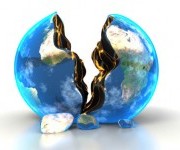So here’s a fresh theory on how in the face of overwhelming scientific evidence, the number of believers in cataclysmic climate change keeps dropping: People don’t want to hear about the cataclysmic part.
Slowly place fingers in ears: That’s the conclusion coming from researchers at the University of California at Berkeley who say that dire messages about the future of the planet can backfire. They found that people who view the world as a fundamentally fair and stable place often choose to tune out threatening forecasts of the future. But those same people, if presented with positive solutions to global warming, tended to become less skeptical. [HealthCanal.com]
As Andrew Revkin points out in his Dot Earth blog the study “reinforces the case that a large part of the climate challenge is not out in the world of eroding glaciers and limited energy choices, but inside the human mind.”
Round up a posse: Not so coincidentally, another call to arms has gone out to climate scientists, this one in a letter in the journal Science. It calls for a full-blown campaign to help “people, organizations, and governments make informed decisions” about climate change and adds:
The initiative should recruit a full range of climate scientists, decision scientists, and communication professionals into the effort to ensure both sound scientific information and effective communication. In addition, it should build bridges to other communities of experts — such as clergy, financial managers, business managers, and insurers — who help people, organizations, and governments assess and express their values. Scientists and nonscientists alike inevitably interpret climate science information in the context of other information and values; the initiative should mobilize experts who can facilitate appropriate and useful interpretations.
Climate Progress has more. This comes on the heels of the formation of a “rapid response team” of climate scientists who will venture into enemy territory — right-wing talk radio and TV shows — to counter distortions of scientific research.
And in other green news:
Aka WTF: The White House’s point man for climate change, Todd Stern, says “there is puzzlement around the world” about the election of so many climate change deniers to Congress. [AFP]
It’s my party and I’ll cry if I want to: Even some Republicans are puzzled. Sherwood Boehlert, a Republican member of Congress from New York for 24 years, had this to say in today’s Washington Post:
The new Congress should have a policy debate to address facts rather than a debate featuring unsubstantiated attacks on science. We shouldn’t stand by while the reputations of scientists are dragged through the mud in order to win a political argument. And no member of any party should look the other way when the basic operating parameters of scientific inquiry — the need to question, express doubt, replicate research and encourage curiosity — are exploited for the sake of political expediency. My fellow Republicans should understand that wholesale, ideologically based or special-interest-driven rejection of science is bad policy. And that in the long run, it’s also bad politics.
The pause that perplexes: Add to that one helluva of a swan song from Republican Rep. Bob Inglis (S.C.), who lost in the primary to a more conservative challenger. During a hearing of the House Science and Technology Committee, he raked over talk show hosts who declare global warming a hoax (rhymes with mush) and climate change deniers in his own party. And he issued this warning:
I would also suggest to my Free Enterprise colleagues — especially conservatives here — whether you think it’s all a bunch of hooey, what we’ve talked about in this committee, the Chinese don’t. And they plan on eating our lunch in this next century. They plan on innovating around these problems, and selling to us, and the rest of the world, the technology that’ll lead the 21st century. So we may just press the pause button here for several years, but China is pressing the fast-forward button. And as a result, if we wake up in several years and we say, “geez, this didn’t work very well for us.”
Power splurge: Now back to the dark side of Congress. Rep. Doc Hastings (R-Wash.) is making a power play to have energy policy shifted to the House Natural Resources Committee, which, it so happens, he will chair next year. Energy lobbyists would love to see that play out because the Natural Resources panel is loaded with conservative Republicans. [Politico]
Money walks: Okay, so the death of climate legislation withered the U.S. market, but American cleantech companies are adjusting by going after business in Europe and China. [Yale e360]
Let’s go with medium rare: The bad news: As China reduces exports, analysts expect a shortage next year of rare earth elements, which are key components of many cleantech products, such as batteries used in electric cars, solar energy cells, and wind turbines. [Energy Daily] The not-so-bad news: Rare earth elements are actually not so rare in the U.S. [Energy Daily]
Just below “Don’t even think about breathing”: The air in Beijing was so polluted Friday that the U.S. Embassy described it simply as “crazy bad.” Outdoor events were cancelled as the air filled with smoke due to the growing number of industrial plants outside the city that are burning coal for the winter. Oh, and the city is adding an estimated 1,200 more cars a day. [AP]
The wind beneath their wings: The Philadelphia Eagles want their stadium to be the first in the world with self-generating renewable energy. Their plan is to install 80 spiral-shaped wind turbines and 2,500 solar panels atop the stadium. [AFP]
Thanks for “caring”: And if you need a good laugh to get you into the weekend, check out the new Funny or Die video with its latest take on greenwashing by Chevron. It features the line: “We are going to
make pretending to care the new caring.” Say no more.




